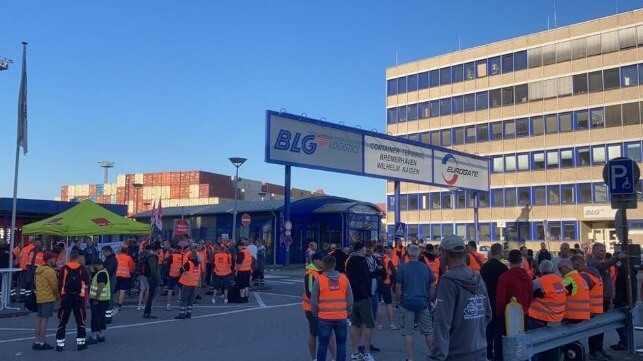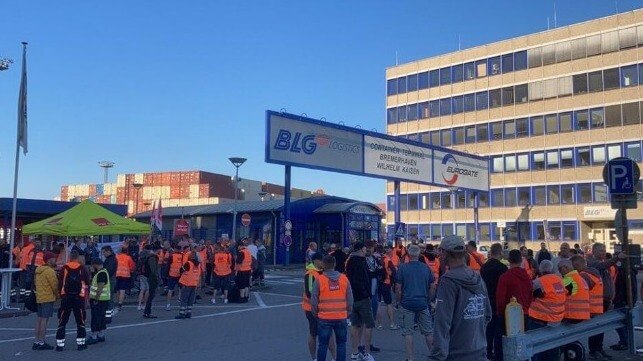[ad_1]

The Maritime Executive
Ports across Germany were paralyzed on Thursday as the trade union Ver.di staged what it calls a “warning strike,” after they said they were at an impasse with the Central Association of Germany Seaports over their collective bargaining agreement. For the second time in less than a month, the union has sought to pressure employers to meet their demands for wage increases. The result is a growing backlog of ships across the North Sea.
The union represents approximately 12,000 workers at the seaports of Emden, Bremerhaven, Bremen, Brake, Wilhelmshaven, and Hamburg. Reports indicate that work at all of the ports came to a halt this morning with the first shift and the workers were vowing not to return until Friday morning’s first shift. The union reported that 4,000 workers attended the rally in Hamburg, with the police confirming large numbers they estimated at possibly 3,500 people. The police dispersed some of the demonstrators that were using firecrackers and noise makers, but most of the demonstrations were reported peaceful.
“The offer made by the employers in the fourth round of negotiations is totally inadequate; it has not brought any substantial improvement to the previous offer but turned out to be a classic deceptive package,” said ver.di negotiator Maya Schwiegershausen-Güth. “It is unacceptable that employers want to leave employees largely alone with the effects of the rapidly increasing prices,” continued Schwiegershausen-Güth. “The employees have worked to the limit in recent years and kept the supply chains together. They deserve real recognition and their fair share.”
The union is demanding a 14 percent increase or 1.20 euros per hour across the 58 collective bargaining companies including at the primary ports of Hamburg and Bremerhaven. They are also demanding an annual bonus of up to 1,200 euros due in part to the rampant inflation which is driving up the cost of living. The union also is demanding that the contract only cover 12 months, while the employers are offering increases of up to 11 percent over 18 months.
Die @BremenPolizei hat am Vormittag eine spontane Kundgebung von Hafenarbeitern beendet. Die Belegschaft zündete Rauchtöpfe, Bengalos und Böller vor dem Hotel, in dem @verdi_bremen und Arbeitgeber #Tarifverhandlungen führen. pic.twitter.com/PnbDYXDNyH
— Sebastian Manz (@SebastianManz) June 21, 2022
The union said it would like to have avoided another strike but that it had no choice but to take to the streets for the first time since the 1970s to demand better conditions for its members. The union previously staged a four-hour warning strike at the beginning of June. They are promising to continue to increase the pressure on employers while calling for further negotiations. “You can not have the last word,” said Schwiegershausen-Güth
Besides Hamburg and Bremerhaven, the union expected workers to stay off all three shifts today in all the smaller ports along the North Sea. Reports indicated that almost the entire workforce honored the strike in Bremen as well as ports ranging from Wilhelmshaven to Brecht and Emden.
The shipping industry is warning of the costs and severe impact on the supply chain even from these brief strikes. Currently, they are saying there are already 30 ships waiting in the North Sea for berths. This includes 15 large containerships.
“The situation in the North Sea is not yet leading to a dramatic collapse in Germany’s maritime trade,” said Vincent Stamer, Head of the Kiel Institute while noting, “but it is certainly a burden, especially for shipping with Asia.”
The Kiel Institute reported that two percent of the world’s trade was now stuck in the North Sea. They said that already 12 percent of Germany’s shipped goods are stuck and it is expected to rise in the coming days.
[ad_2]
Source link








